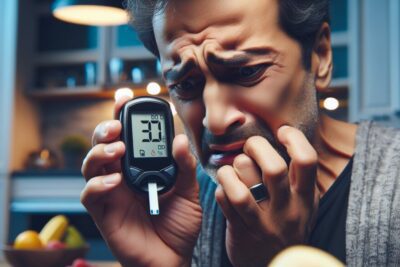
Diabetes and depression are two prevalent health conditions that impact millions of people worldwide. Both are serious conditions on their own, but when they coexist, the combination can be particularly challenging for affected individuals. Understanding how these conditions are related is crucial for effective management and treatment.
🔍 Seeking a breakthrough in Type 2 Diabetes management?
Discover our expert insights and innovative approaches on ‘How to Cure Diabetes’.
Click to transform your health journey today!
What you\'ll find in this article?
- What Is the Relationship Between Diabetes and Depression?
- How Does Depression Affect Diabetes Management?
- What Are the Symptoms of Depression in Diabetic Patients?
- Can Depression Cause Type 2 Diabetes?
- Coping Strategies for Managing Depression and Diabetes
- How to Seek Help for Depression and Diabetes
- Further Insights on Diabetes and Depression
- Related Questions on Diabetes and Depression
What Is the Relationship Between Diabetes and Depression?
Individuals living with diabetes are at a higher risk of experiencing depression compared to the general population. The link between diabetes and depression is complex and appears to be bidirectional. Diabetes can lead to psychological stress, which may trigger depressive symptoms, while depression can make diabetes management more difficult, potentially leading to poorer blood sugar control.
Pathophysiological mechanisms such as inflammation and stress can exacerbate both conditions. Furthermore, certain lifestyle factors associated with diabetes, like diet and physical activity, can also influence one's mental health.
Understanding this connection is the first step towards developing a comprehensive treatment plan that addresses both the mental and physical aspects of these conditions.
Explore our specialized services in diabetes care 🌟.
From personalized diet plans to effective exercise routines, we have what you need to take control of Type 2 Diabetes.
Visit our services page now!












How Does Depression Affect Diabetes Management?
Depression in individuals with diabetes can lead to reduced motivation, which may result in poorer adherence to treatment plans. Managing diabetes requires constant monitoring of blood glucose levels, adherence to dietary restrictions, and regular physical activity, which can be overwhelming for someone suffering from depression.
Depression can also disrupt sleep patterns, alter eating habits, and reduce energy levels, further complicating diabetes management. It is crucial for healthcare providers to recognize these impacts and provide support to improve both mental health and diabetes outcomes.
This complex interaction underlines the importance of integrated care for patients with coexisting diabetes and depression.
What Are the Symptoms of Depression in Diabetic Patients?
Recognizing the symptoms of depression in individuals with diabetes is key to timely and effective treatment. Some of the common symptoms include persistent sadness, lack of interest in activities once enjoyed, significant weight change, fatigue, and difficulty concentrating.
It is also important to be aware of feelings of worthlessness or guilt, which can be particularly pronounced in people who feel they are failing in their diabetes management.
Patients and caregivers should be vigilant for these signs and seek help promptly.
Can Depression Cause Type 2 Diabetes?
While the relationship between diabetes and depression is often seen as diabetes leading to depression, research suggests that the reverse can also be true. Chronic stress and depression can lead to behaviors that increase the risk of developing type 2 diabetes.
Additionally, the biological effects of depression, such as changes in cortisol levels and inflammation, may contribute to insulin resistance and ultimately lead to diabetes.
Understanding this potential pathway highlights the importance of managing stress and treating depression proactively.
Coping Strategies for Managing Depression and Diabetes
- Maintain regular check-ups with healthcare providers.
- Engage in physical activity, which can improve both mood and blood sugar control.
- Adopt a balanced diet that supports both mental and physical health.
- Seek support from friends, family, or support groups.
- Consider psychological therapies such as cognitive-behavioral therapy (CBT).
- Medication may be prescribed for both diabetes and depression management.
How to Seek Help for Depression and Diabetes
If you or someone you know is struggling with both diabetes and depression, it is critical to seek help from healthcare professionals. Start by talking to your primary care doctor or endocrinologist, who can refer you to a mental health specialist if necessary.
There are also many resources available, including hotlines and online support groups, which can provide both information and emotional support.
Remember, seeking help is a sign of strength, and effective treatment can improve quality of life significantly.
Further Insights on Diabetes and Depression
For those seeking more information, here is a video that delves deeper into the connection between diabetes and depression:
What Is the Link Between Diabetes and Depression?
The link between diabetes and depression involves several factors, including physiological stress, lifestyle limitations, and the psychological toll of managing a chronic illness. Both can influence and exacerbate the other, making comprehensive treatment vital.
Research suggests that the stresses of managing diabetes can lead to depression, while depression can make managing diabetes more difficult.
What Emotional Problems Does Diabetes Cause?
Diabetes can lead to a range of emotional problems, including anxiety, distress related to diabetes management, and fear of complications. The constant need for vigilance in diabetes control can be overwhelming and may result in emotional fatigue.
Diabetes distress specifically refers to the emotional burdens and worries that result from living with diabetes and can significantly impact one's quality of life.
How to Deal with Diabetic Depression?
Dealing with diabetic depression involves a multi-faceted approach. This includes psychological support, medication when necessary, lifestyle changes, and ensuring a strong support network.
It is also beneficial to work with a healthcare professional who understands the complexities of managing both conditions.
What Are the Symptoms of Diabetic Burnout?
Symptoms of diabetic burnout include feeling overwhelmed by the daily demands of diabetes management, neglecting diabetes care tasks, a decrease in adherence to medication, and experiencing feelings of frustration or defeat.
Recognizing these symptoms is essential for preventing long-term complications and ensuring continued engagement in health-promoting behaviors.
By understanding the complex links between diabetes and depression, individuals and healthcare providers can develop more effective strategies for managing these conditions. Regular screenings for depression among diabetic patients, integrated care approaches, and a strong support system are essential components of successful management and improved health outcomes.
✨ Other articles you might be interested in:



